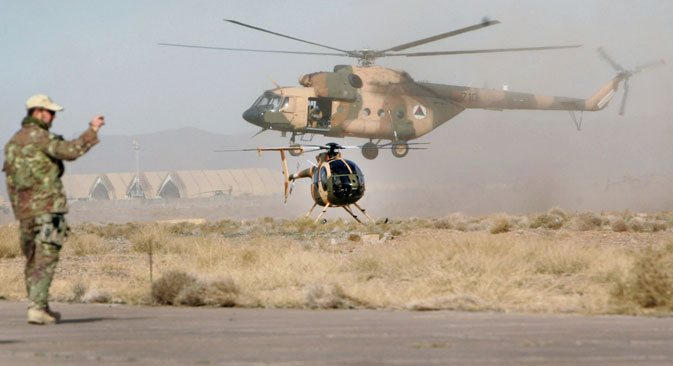
Earlier this year Pentagon had agreed to buy a total of 63 Mi-17 V5 helicopters for the Kabul government at a cost of $1.1 billion. Source: AP
Russian military experts have accused the U.S. Defense Department of playing politics and bowing to lobbyists in its cancellation of an additional $345 million worth of Russian Mi-17 helicopters for the Afghan air force.
The Pentagon last week cancelled a plan to buy 15 more Russian Mi-17 helicopters to beef up the Afghan air force, citing weapons sales from Rosoboronexport, the state arms exporter, to the Syrian government.
Russia supplies 12 Mil Mi-17V-5 helicopters for Afghanistan - Rosoboronexport
Russia to supply Mi-17 helicopters to Cameroon
US Senate’s ban on Russian arms exporter may damage bilateral cooperation
"From the very beginning it was clear that this deal was very sensitive. There were constant demands in the U.S. to get out of it for political reasons," said Vasily Kashin, an expert from the Center for Analysis of Strategies and Technologies.
Kashin added that previous to this, no one had doubted that the Mi-17 would be the best choice for the Afghan air force. "In Afghanistan, there is a big problem with the staff. They at least still have some technicians who have experience with Soviet equipment. But Afghans do not know how to properly maintain machinery from Western producers," Kashin said.
The United States, whose troops are scheduled to leave Afghanistan in early 2014, already purchased 20 Russian Mi-17. According to an agreement that is part of the joint effort of Moscow and Washington to combat international terrorism, the Pentagon had agreed to buy a total of 63 Mi-17 V5 helicopters for the Kabul government at a cost of $1.1 billion.
But on November 12, Pentagon spokeswoman Maureen Schumann announced that the Defense Department was forced to scrap the procurement plans for the Afghan security forces in 2014 "after consulting with Congress." Meanwhile, she confirmed that all previous agreements with Russia remain valid and will be fulfilled on time.
Several U.S. senators said they supported the Pentagon’s decision.
"I applaud the Defense Department's decision to finally cancel its plan to buy additional helicopters from Rosoboronexport. Doing business with the supplier of these helicopters has been a morally bankrupt policy, and as a nation, we should no longer be subsidizing Assad's war crimes in Syria," said Sen. John Cornyn, a Republican from Texas.
Back in March, a group of congressmen sent a letter to U.S. Secretary of Defense Chuck Hagel with an appeal not to purchase military equipment from Russia "because of their position on the Syrian issue." The chorus of politicians was joined by some military experts who claimed that the Pentagon was "overcharged" for the Russian helicopters.
In August, General Director of Rosoboronexport Anatoly Isaykin said that the attempt of Congress to block the helicopter deal is the work of lobbyists, "protecting the interests of U.S. companies, who manufacture more expensive helicopters than ours." This theory is supported indirectly, he added, by the fact that the Pentagon's decision not to buy Russian helicopters was publicly welcomed by Sen. Richard Blumenthal, whose state of Connecticut is home to Sikorsky Aircraft, a competitor of the Russians.
Blumenthal said that he was "flattered" by the fact that his repeated appeals to the Defense Department had an effect.
"This unnecessary and costly contract should have been canceled long ago so that taxpayers' dollars are not spent indirectly to buy weapons for the Assad regime that is killing Syrians," Blumenthal said in a statement.
However, Fyodor Lukyanov, editor in chief of “Russia in Global Affairs,” did not see any political motives in the Pentagon's decision, and calls Cornyn's statement a "political package."
"The main reason is purely financial," he said. "But they were able to come up with a good excuse. Russia, they point out, sells weapons to the inhumane Syrian regime.”
Speaking at a congressional hearing in April of this year, Chuck Hagel praised the Russian military aircraft, calling the Mi-17 "simple and easy to maintain," and noting that the Afghans like the helicopter.
Lukyanov added that the Pentagon clearly made the decision under the pressure from the military industry lobby in the United States.
"This will not affect Russia. The Mi-17 is sought out by many countries in the world, including NATO countries," said Igor Korotchenko, the chief editor of “National Defense.” He stressed that this one contract will not have an impact on the volume of military equipment exports.
Korochenko said the Syrian issue is "far-fetched" and the actual reason was pressure from U.S. companies. "The main losers here are the Americans. The Afghan army is not in the best condition already, and without our helicopters, it will be even more ineffective.”
However, Korochenko said the cancelation of the deal with Rosoboronexport is not a good sign for future relations between Russia and the United States.
Based on materials from Rossiyskaya Gazeta and Gazeta.ru.
All rights reserved by Rossiyskaya Gazeta.
Subscribe
to our newsletter!
Get the week's best stories straight to your inbox